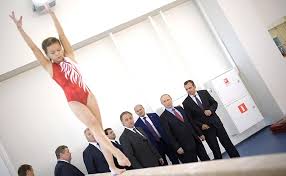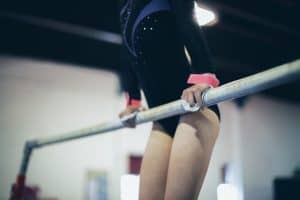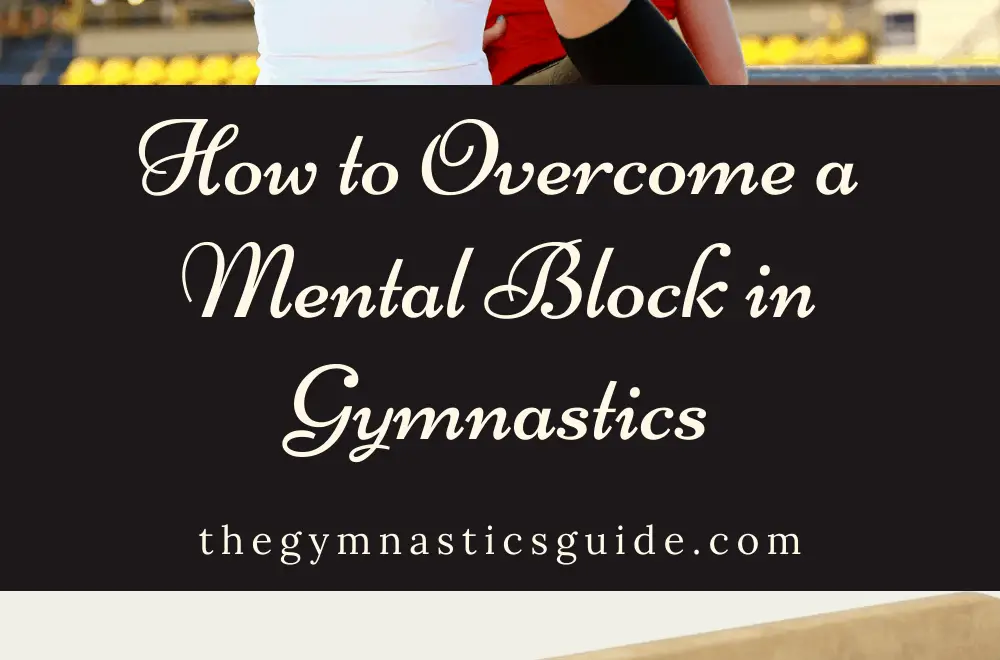If you watched any gymnastics in the 2020 Olympics, it was hard to miss the news about Simone Biles’ shocking withdrawal due to her mental health, specifically, a mental block. Some gymnasts call it “the twisties”. Others call it “getting lost in the air”. Sometimes, it’s an overwhelming fear of a skill, or a group of skills. No matter what you call it, a mental block in gymnastics can be challenging to overcome.
If you’ve experienced this terrifying phenomenon, you know exactly how Simone was feeling. As a gymnast in that situation, you’d do anything to make it go away! And if you’re a coach or a parent of a gymnast with a mental block, you’re probably looking for ways to help them – fast!

What is a Mental Block in Gymnastics?
A gymnast with a mental block is unable to perform previously learned skills because of a disconnect between her brain and her body. The gymnast might say things like, “I just can’t make myself go for it”, “I don’t trust myself”, or “I don’t know where I am in the air”.
Sometimes a block can feel like a lost sense of air awareness. Other times it can feel like a paralyzing fear of performing a skill.
Mental blocks can occur during many different types of skills. I personally dealt with several of them throughout my career, and I have also helped many gymnasts through them as a coach.
The first time I had a mental block, I had difficulty going backwards on beam. I would stand there for the whole beam rotation, frozen, unable to do any backward skills on beam. Another time, I had a block on vault. A third time, I developed a block when performing dismounts on bars. I hit my feet on the bar one time, and after that, I felt like I had no idea when to let go. It was as if my muscle memory had been erased. Scary stuff!!!
What Causes a Mental Block in Gymnastics
There are several reasons a gymnast can develop a mental block in gymnastics. Here are some of the most common reasons.
Mistakes
One reason a gymnast can get a mental block is because of a mistake. Just like when I hit my feet on the bar on a dismount, gymnasts can have a mistake that doesn’t cause an injury, but still causes a block. I wasn’t hurt when I hit my feet. But something was definitely different afterward.
I’ve seen gymnasts develop mental blocks after poor landings on tumbling passes, missing a hand or foot on the beam, or from taking a scary fall. Making a mistake like this doesn’t always result in a mental block, but the possibility is there.
Injuries
A more serious mistake can cause a gymnast to become injured. Injuries can cause a gymnast to become worried about the chance of re-injury. Those worries can result in fears or mental blocks unless the gymnast takes steps to avoid them.
After an injury, it’s important for the gymnast to work on mental rehabilitation and recovery along with physical rehab. Using thorough physical and mental preparation for return to sport can help to prevent mental blocks in gymnastics.
Long breaks from gymnastics
When I developed my mental block surrounding back tumbling on beam, I had just returned from a month-long study abroad trip. I had not done any gymnastics, not even set foot in a gym, while I was gone. Before the trip, I could do all of my beam skills with no problem. But when I returned, somehow, my body would NOT let me go backwards on the beam!
Now, this is not to say that gymnasts should not take vacations. Vacations are great for physical and mental rest, and I am 100% in support of vacations. However, if a trip will be long (a few weeks or longer), it’s a good idea to do some physical and mental preparation prior to getting back into the gym. Or, if there’s a place to train periodically while you’re gone, even better!
Age
Gymnasts are more likely to have mental blocks as they get older, although they can certainly happen to younger gymnasts as well. As a gymnast moves into the preteen/teen years, she can more easily grasp the concept of the potential for injury during her gymnastics skills. Throw in growth spurts, body changes, and increased pressure to perform, and teenage gymnasts are highly susceptible to mental health issues.
Other Factors
There are a number of other factors that could contribute to a mental block in gymnastics.
Some of these factors can include stressful life events or changes in the family structure, changing schools, moving, feeling overwhelmed in or out of the gym, and increased pressure from coaches or parents, just to name a few.
In order to help a gymnast through her mental block, be sure to address these underlying factors that may be affecting the gymnast’s ability to perform her gymnastics skills. In some cases, seeing a therapist can help a gymnast to deal with anxiety or stress.

How to Get Rid of a Mental Block in Gymnastics
With my history of mental blocks as a gymnast, I have always loved helping other gymnasts get over a mental block. I remember how frustrated my coaches would get when they tried to help me, and I became determined to stay patient with my gymnasts as they worked through mental issues. Here are some of the tried and true methods I have used.
Drill, Drill, Drill
The first step should always be to take a step backward by simplifying the skill. Think about the components of the skill, and if possible, determine which part of the skill the gymnast is having trouble with.
Go back to drills for that part of the skill. Do those drills over and over and over again. When you think you’ve done enough drills, do a few more.
It’s often helpful to do more work on soft mats or into the pit, depending on the skill. On beam, work on a line or a floor beam until the skill is automatic. Then, move up to a medium beam with mats stacked, and gradually take the mats away. Using a beam pad is helpful for some gymnasts. Do lots of basics and lead-up work. Spot as necessary.
Make a plan for the drills to be completed at each practice, and for how the gymnast will progress through them. Don’t be afraid to alter the plan if the gymnast needs to spend more time on one step. The goal is to build confidence while regaining skills.
In my experience, taking a step back is by far the most important and valuable tool when working to overcome a mental block in gymnastics. It builds the gymnast’s confidence and muscle memory back up, and as a bonus, their technique might improve, too!
Visualize

Visualization, or imagery, is an extremely powerful tool for gymnasts hoping to improve their performance or overcome a mental block.
Gymnasts can visualize themselves performing a skill or routine perfectly, over and over again. Visualization in gymnastics is most effective when it is performed consistently. This helps to train the mind and build confidence.
The basics of visualization include:
- Find a calm, quiet space.
- Close your eyes and imagine yourself performing the skill or routine with perfect form and technique.
- Imagine all of the details: what the chalk feels like on your hands, the beam under your feet, the sound of the floor when you tumble, etc.
- Perform the visualization daily, for about 5-10 minutes.
Click here to read more on visualization techniques.
Count to Three
This is a simple technique which works for some gymnasts. It may not work for gymnasts with more long-lasting or severe mental blocks, though.
Either the gymnast or coach counts to three, with the gymnast performing the skill on 3. A coach can spot the skill if it makes the gymnast feel more comfortable.
A variation of this technique is to have the gymnast perform the same beam/floor choreography or mental routine prior to performing the skill.
Coaches, remember not to count audibly at a meet, though, or the gymnast could receive a coaching deduction.
Be Patient
Above all, be patient with your gymnast! And if you’re the gymnast, be patient with yourself.
If you try to push a gymnast too hard or too quickly while they are experiencing a mental block, it’s likely to have the opposite effect. The gymnast will have more mental capacity to relearn her skills if she does not feel pressured to do so.
It’s tough to be patient when a gymnast is suddenly unable to perform her skills. But it’s worth it. The ability to remain calm and focused on mental health will result in a huge payoff in the athlete-coach relationship. Not only will it help the gymnast regain her skills in the short term, but it will lay the foundation for continued success.
Closing Thoughts
Mental blocks in gymnastics are very common, but they are frustrating for gymnast and coach alike. The strategies outlined above can help you develop a plan to overcome the mental block. I’ve also got a great (free!) Goal Setting Workbook that is customizable and can help gymnast and coach set a plan for success. Click here to get your Goal Setting Workbook!
Further Reading
How to Overcome Fear in Gymnastics
